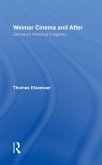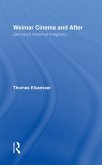39,95 €
39,95 €
inkl. MwSt.
Sofort per Download lieferbar

20 °P sammeln
39,95 €
Als Download kaufen

39,95 €
inkl. MwSt.
Sofort per Download lieferbar

20 °P sammeln
Jetzt verschenken
Alle Infos zum eBook verschenken
39,95 €
inkl. MwSt.
Sofort per Download lieferbar
Alle Infos zum eBook verschenken

20 °P sammeln
- Format: PDF
- Merkliste
- Auf die Merkliste
- Bewerten Bewerten
- Teilen
- Produkt teilen
- Produkterinnerung
- Produkterinnerung

Bitte loggen Sie sich zunächst in Ihr Kundenkonto ein oder registrieren Sie sich bei
bücher.de, um das eBook-Abo tolino select nutzen zu können.
Hier können Sie sich einloggen
Hier können Sie sich einloggen
Sie sind bereits eingeloggt. Klicken Sie auf 2. tolino select Abo, um fortzufahren.

Bitte loggen Sie sich zunächst in Ihr Kundenkonto ein oder registrieren Sie sich bei bücher.de, um das eBook-Abo tolino select nutzen zu können.
Sabine Hake traces German film's relationship with other national cinemas and popular culture as a whole, and focuses on key themes including genre, audiences and stars.
This fully revised and updated new edition will be required reading for everyone interested in German film and the history of modern Germany.
- Geräte: PC
- mit Kopierschutz
- eBook Hilfe
- Größe: 5.67MB
Andere Kunden interessierten sich auch für
![German National Cinema (eBook, ePUB) German National Cinema (eBook, ePUB)]() Sabine HakeGerman National Cinema (eBook, ePUB)39,95 €
Sabine HakeGerman National Cinema (eBook, ePUB)39,95 €![Weimar Cinema and After (eBook, PDF) Weimar Cinema and After (eBook, PDF)]() Thomas ElsaesserWeimar Cinema and After (eBook, PDF)39,95 €
Thomas ElsaesserWeimar Cinema and After (eBook, PDF)39,95 €![Weimar Cinema and After (eBook, ePUB) Weimar Cinema and After (eBook, ePUB)]() Thomas ElsaesserWeimar Cinema and After (eBook, ePUB)39,95 €
Thomas ElsaesserWeimar Cinema and After (eBook, ePUB)39,95 €![South African National Cinema (eBook, PDF) South African National Cinema (eBook, PDF)]() Jacqueline MaingardSouth African National Cinema (eBook, PDF)39,95 €
Jacqueline MaingardSouth African National Cinema (eBook, PDF)39,95 €![Brazilian National Cinema (eBook, PDF) Brazilian National Cinema (eBook, PDF)]() Lisa ShawBrazilian National Cinema (eBook, PDF)37,95 €
Lisa ShawBrazilian National Cinema (eBook, PDF)37,95 €![Japanese Cinema (eBook, PDF) Japanese Cinema (eBook, PDF)]() Japanese Cinema (eBook, PDF)47,95 €
Japanese Cinema (eBook, PDF)47,95 €![Violence and American Cinema (eBook, PDF) Violence and American Cinema (eBook, PDF)]() Violence and American Cinema (eBook, PDF)39,95 €
Violence and American Cinema (eBook, PDF)39,95 €-
-
-
Sabine Hake traces German film's relationship with other national cinemas and popular culture as a whole, and focuses on key themes including genre, audiences and stars.
This fully revised and updated new edition will be required reading for everyone interested in German film and the history of modern Germany.
This fully revised and updated new edition will be required reading for everyone interested in German film and the history of modern Germany.
Dieser Download kann aus rechtlichen Gründen nur mit Rechnungsadresse in A, B, BG, CY, CZ, D, DK, EW, E, FIN, F, GR, HR, H, IRL, I, LT, L, LR, M, NL, PL, P, R, S, SLO, SK ausgeliefert werden.
Produktdetails
- Produktdetails
- Verlag: Taylor & Francis eBooks
- Seitenzahl: 288
- Erscheinungstermin: 11. Januar 2013
- Englisch
- ISBN-13: 9781136020469
- Artikelnr.: 45131730
- Verlag: Taylor & Francis eBooks
- Seitenzahl: 288
- Erscheinungstermin: 11. Januar 2013
- Englisch
- ISBN-13: 9781136020469
- Artikelnr.: 45131730
- Herstellerkennzeichnung Die Herstellerinformationen sind derzeit nicht verfügbar.
Sabine Hake is the Texas Chair of German Literature and Culture in the Department of Germanic Studies at the University of Texas at Austin. She is the author of several books on German cinema and Weimar culture, including The Cinema's Third Machine: German Writings on Film 1907-1933 (1993) and Popular Cinema of the Third Reich (2001).
Introduction 1. Wilhelmine Cinema 1895-1919. Cinema: A New Technology,
Industry and Mass Medium. Elements of a National Cinema: Stars, Genres and
Directors. German Cinema after the First World War 2. Weimar Cinema
1919-33. Weimar Cinema as Art Cinema. Weimar Cinema as Popular Cinema.
Film, Politics, and the Coming of Sound 3. Third Reich Cinema 1933-45. The
Restructuring of the Film Industry. Third Cinema as Popular Cinema. Third
Reich Cinema as Political Cinema 4. Post-War Cinema 1945-61. The
Reconstruction of the Film Industry. Rewriting History, Forging New
Identities. The Politicisation of Cinema in the East. The Depoliticisation
of Cinema in the West 5. East German Cinema 1961-89. The New Waves and the
Plenary. The Seventies: The Discovery of Everyday Life. The Eighties:
Crises and Transformation 6. West German Cinema 1962-89. The Oberhausen
Manifesto and the Young German Cinema. The Seventies: The Emergence of New
German Cinema. The Eighties: Crises and Transformation 7. Post-Unification
Cinema 1989-2000. Elements of Popular Cinema: The Return to Genre. Once
Again: Coming to Terms with the Past(s)
Industry and Mass Medium. Elements of a National Cinema: Stars, Genres and
Directors. German Cinema after the First World War 2. Weimar Cinema
1919-33. Weimar Cinema as Art Cinema. Weimar Cinema as Popular Cinema.
Film, Politics, and the Coming of Sound 3. Third Reich Cinema 1933-45. The
Restructuring of the Film Industry. Third Cinema as Popular Cinema. Third
Reich Cinema as Political Cinema 4. Post-War Cinema 1945-61. The
Reconstruction of the Film Industry. Rewriting History, Forging New
Identities. The Politicisation of Cinema in the East. The Depoliticisation
of Cinema in the West 5. East German Cinema 1961-89. The New Waves and the
Plenary. The Seventies: The Discovery of Everyday Life. The Eighties:
Crises and Transformation 6. West German Cinema 1962-89. The Oberhausen
Manifesto and the Young German Cinema. The Seventies: The Emergence of New
German Cinema. The Eighties: Crises and Transformation 7. Post-Unification
Cinema 1989-2000. Elements of Popular Cinema: The Return to Genre. Once
Again: Coming to Terms with the Past(s)
Introduction 1. Wilhelmine Cinema 1895-1919. Cinema: A New Technology, Industry and Mass Medium. Elements of a National Cinema: Stars, Genres and Directors. German Cinema after the First World War 2. Weimar Cinema 1919-33. Weimar Cinema as Art Cinema. Weimar Cinema as Popular Cinema. Film, Politics, and the Coming of Sound 3. Third Reich Cinema 1933-45. The Restructuring of the Film Industry. Third Cinema as Popular Cinema. Third Reich Cinema as Political Cinema 4. Post-War Cinema 1945-61. The Reconstruction of the Film Industry. Rewriting History, Forging New Identities. The Politicisation of Cinema in the East. The Depoliticisation of Cinema in the West 5. East German Cinema 1961-89. The New Waves and the Plenary. The Seventies: The Discovery of Everyday Life. The Eighties: Crises and Transformation 6. West German Cinema 1962-89. The Oberhausen Manifesto and the Young German Cinema. The Seventies: The Emergence of New German Cinema. The Eighties: Crises and Transformation 7. Post-Unification Cinema 1989-2000. Elements of Popular Cinema: The Return to Genre. Once Again: Coming to Terms with the Past(s)
Introduction 1. Wilhelmine Cinema 1895-1919. Cinema: A New Technology,
Industry and Mass Medium. Elements of a National Cinema: Stars, Genres and
Directors. German Cinema after the First World War 2. Weimar Cinema
1919-33. Weimar Cinema as Art Cinema. Weimar Cinema as Popular Cinema.
Film, Politics, and the Coming of Sound 3. Third Reich Cinema 1933-45. The
Restructuring of the Film Industry. Third Cinema as Popular Cinema. Third
Reich Cinema as Political Cinema 4. Post-War Cinema 1945-61. The
Reconstruction of the Film Industry. Rewriting History, Forging New
Identities. The Politicisation of Cinema in the East. The Depoliticisation
of Cinema in the West 5. East German Cinema 1961-89. The New Waves and the
Plenary. The Seventies: The Discovery of Everyday Life. The Eighties:
Crises and Transformation 6. West German Cinema 1962-89. The Oberhausen
Manifesto and the Young German Cinema. The Seventies: The Emergence of New
German Cinema. The Eighties: Crises and Transformation 7. Post-Unification
Cinema 1989-2000. Elements of Popular Cinema: The Return to Genre. Once
Again: Coming to Terms with the Past(s)
Industry and Mass Medium. Elements of a National Cinema: Stars, Genres and
Directors. German Cinema after the First World War 2. Weimar Cinema
1919-33. Weimar Cinema as Art Cinema. Weimar Cinema as Popular Cinema.
Film, Politics, and the Coming of Sound 3. Third Reich Cinema 1933-45. The
Restructuring of the Film Industry. Third Cinema as Popular Cinema. Third
Reich Cinema as Political Cinema 4. Post-War Cinema 1945-61. The
Reconstruction of the Film Industry. Rewriting History, Forging New
Identities. The Politicisation of Cinema in the East. The Depoliticisation
of Cinema in the West 5. East German Cinema 1961-89. The New Waves and the
Plenary. The Seventies: The Discovery of Everyday Life. The Eighties:
Crises and Transformation 6. West German Cinema 1962-89. The Oberhausen
Manifesto and the Young German Cinema. The Seventies: The Emergence of New
German Cinema. The Eighties: Crises and Transformation 7. Post-Unification
Cinema 1989-2000. Elements of Popular Cinema: The Return to Genre. Once
Again: Coming to Terms with the Past(s)
Introduction 1. Wilhelmine Cinema 1895-1919. Cinema: A New Technology, Industry and Mass Medium. Elements of a National Cinema: Stars, Genres and Directors. German Cinema after the First World War 2. Weimar Cinema 1919-33. Weimar Cinema as Art Cinema. Weimar Cinema as Popular Cinema. Film, Politics, and the Coming of Sound 3. Third Reich Cinema 1933-45. The Restructuring of the Film Industry. Third Cinema as Popular Cinema. Third Reich Cinema as Political Cinema 4. Post-War Cinema 1945-61. The Reconstruction of the Film Industry. Rewriting History, Forging New Identities. The Politicisation of Cinema in the East. The Depoliticisation of Cinema in the West 5. East German Cinema 1961-89. The New Waves and the Plenary. The Seventies: The Discovery of Everyday Life. The Eighties: Crises and Transformation 6. West German Cinema 1962-89. The Oberhausen Manifesto and the Young German Cinema. The Seventies: The Emergence of New German Cinema. The Eighties: Crises and Transformation 7. Post-Unification Cinema 1989-2000. Elements of Popular Cinema: The Return to Genre. Once Again: Coming to Terms with the Past(s)







